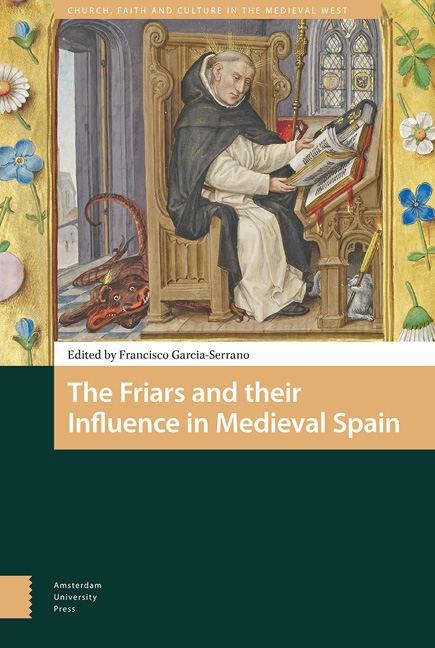Book contents
- Frontmatter
- Contents
- Abbreviations
- List of Illustrations
- Acknowledgements
- Introduction
- 1 Dominicus Hispanus
- 2 Ramon de Penyafort and His Influence
- 3 The Mendicant Orders and the Castilian Monarchy in the Reign of Ferdinand III
- 4 Ramon Marti, the Trinity, and the Limits of Dominican Mission
- 5 Narrative and Counter-Narrative: Dominican and Muslim Preaching in Medieval Iberia
- 6 The Poor Clares of Alcocer and the Castilian Crown (Thirteenth to Fifteenth Centuries)
- 7 Friars and Nuns: Dominican Economy and Religious Identity in Medieval Castile
- 8 Networks of Dissent and the Franciscans of the Crown of Aragon
- 9 Faction, Politics, and Dominican Inquisitors in the Fourteenth-Century Crown of Aragon
- 10 Sutzura e Viltat Carnal: The Place of Sin and Lust in the Treatises of the Franciscan Francesc Eiximenis (c.1400)
- 11 Valencian Dominicans Beyond the Convent of Santo Domingo
- 12 Ferdinand of Antequera and Santo Domingo el Real de Toledo: Patronage, Advice, and Spiritual Favour (c.1390–1416)
- Index
7 - Friars and Nuns: Dominican Economy and Religious Identity in Medieval Castile
Published online by Cambridge University Press: 16 February 2021
- Frontmatter
- Contents
- Abbreviations
- List of Illustrations
- Acknowledgements
- Introduction
- 1 Dominicus Hispanus
- 2 Ramon de Penyafort and His Influence
- 3 The Mendicant Orders and the Castilian Monarchy in the Reign of Ferdinand III
- 4 Ramon Marti, the Trinity, and the Limits of Dominican Mission
- 5 Narrative and Counter-Narrative: Dominican and Muslim Preaching in Medieval Iberia
- 6 The Poor Clares of Alcocer and the Castilian Crown (Thirteenth to Fifteenth Centuries)
- 7 Friars and Nuns: Dominican Economy and Religious Identity in Medieval Castile
- 8 Networks of Dissent and the Franciscans of the Crown of Aragon
- 9 Faction, Politics, and Dominican Inquisitors in the Fourteenth-Century Crown of Aragon
- 10 Sutzura e Viltat Carnal: The Place of Sin and Lust in the Treatises of the Franciscan Francesc Eiximenis (c.1400)
- 11 Valencian Dominicans Beyond the Convent of Santo Domingo
- 12 Ferdinand of Antequera and Santo Domingo el Real de Toledo: Patronage, Advice, and Spiritual Favour (c.1390–1416)
- Index
Summary
Abstract
The early Dominicans struggled to decide what type of relationship they would have with religious women and Dominicans nuns. Although the issue of the cura mulierum (care of women) was addressed in the Dominican constitution, mostly dealing with spiritual needs, this chapter argues, based on examples from the Madrid convent, that the main concern behind the subsistence of female convents was the great revenue that they generated for the order. The convent of Madrid, converted into a female house, was an economic success while it was always closely supervised by friars, dealing with not only spiritual matters but also with earthly affairs.
Keywords: medieval Madrid, medieval Castile, Dominicans, Dominican nuns, economic history, religious history
The early mendicant movement of the thirteenth century sought a humble commitment to apostolic poverty in order to overcome and reject worldly temptations. Their modest clothes revealed the austerity that was emphatically and carefully set down in the rules by which the friars guided their lives. Jordan of Saxony (1222–1237), a companion of Saint Dominic and his successor as master general of the order, took pains to preserve and oversee the conduct of the first Dominicans, as can be perceived in the Liber Consuetudinum, a book containing the primitive constitutions and rules for the preachers. The book is a valuable source of information on the daily lives of the friars as well as their pastoral duties. While the rejection of wealth and the adoption of an austere way of life were central in the early mendicant movement, another issue that seriously concerned the friars was their relationship with society at large, as they were expected to fulfil their pastoral duties throughout the cura animarum (care of souls), of which the cura mulierum (care of women) was a significant part.
Both Saint Francis and Saint Dominic were concerned with the religious condition of women and preached to them, but the relationship between the mendicant friars (as had been the case with Cistercians monks before) and devout women in the thirteenth century was never an easy task. In fact, the main problem arose with the transition from taking care of the spiritual needs of women, who freely chose to lead a devout life, to taking care of nuns, who were required to be cloistered, regulated, and administered.
- Type
- Chapter
- Information
- The Friars and their Influence in Medieval Spain , pp. 159 - 174Publisher: Amsterdam University PressPrint publication year: 2018



